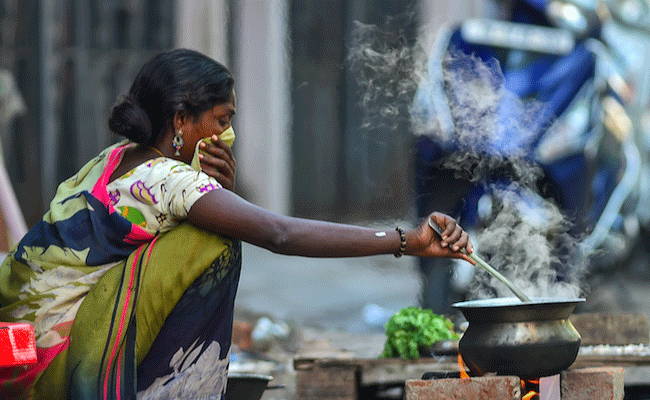Ahmedabad (PTI): Women in the working age category of 15 to 60 years spend 7.2 hours on unpaid domestic work compared to 2.8 hours spent by men, indicating they have "time poverty", as per a research conducted by a professor from the Indian Institute of Management Ahmedabad.
Even wage-earning women spend twice the amount of time on unpaid domestic work in comparison to wage-earning men in fulfilling basic needs of the household such as cleaning, preparing meals and caregiving, says the research which is based on the Time Use Survey (TUS) of the National Sample Survey Office (NSSO).
Though it is a known fact that women spend more time in unpaid household activities, the research paper "Time Use Data: A Tool for Gendered Policy Analysis", claims that it for the first time quantifies the time that women in India spend on domestic work.
"The new thing about this survey is based on the first TUS by the NSSO, we can now point out the exact hours women in the working age category spend on unpaid domestic work. On an average, Indian women spend 7.2 hours of their daily time for such work while men spend 2.8 hours," IIMA Prof Namrata Chindarkar told PTI.
Over the years, time use data has gained significance as a tool to examine gender inequality. Studies based on harmonised time use surveys conducted in Europe reveal that time use data have been instrumental in understanding the allocation of time between women and men across various activities, she said.
"These studies particularly find that, across countries, women spend more time on fulfilling basic needs of the household such as cleaning, preparing meals and caregiving," Chindarkar said.
"The TUS conducted by the NSSO in 2019 is the first national time use survey for India (with the exception of Andaman and Nicobar Islands). It collects data using a 24-hour time diary (4 am to 4 am the next day) on a normal day of the week," she added.
The paper has examined the TUS data to assess whether expectations from gender roles shape the allocation of time between men and women in India.
It further finds out that "even wage-earning women spend twice the amount of time on unpaid domestic work in comparison to wage-earning men".
It also says that "men spend nearly 150 minutes more per day on paid employment relative to women."
"By itself, the average time spent on activities does not provide a sense of severity of the time burden. To capture the severity, we examine time poverty," Chindarkar said.
She said they measure time poverty in terms of overwork based on the OECD definition of working more than 50 hours per week.
"We find that women are 24 per cent more likely to have less leisure time in comparison to men. In contrast, we find that wage-earning men are 72 per cent more likely to be overworked compared to wage-earning women. This could plausibly be because of the differences in the nature of jobs and occupations held by men and women," the research paper said.
The analyses highlight certain gendered patterns. A greater proportion of women's time is devoted to fulfilling domestic responsibilities irrespective of their employment status. For women in employment, this often results in a "second shift", it said.
It is now a stylised fact that effective public services, such as access to electricity and clean cooking energy, can alleviate women's time burden. However, the research paper finds that the magnitude of this difference is small.
"The TUS data suggests that, on an average, women in households that use LPG or other clean cooking fuels spend less time on domestic unpaid activities, which includes meal preparation time, compared to those using traditional fuels. We observe that women in households that use LPG or other clean cooking fuels enjoy an additional leisure time of 41 to 80 minutes compared to those using traditional fuels," the research said.
Looking again at the TUS data, individuals who reported that electricity is the primary source of lighting for the household, reported, on an average, less time spent on domestic unpaid activities. For women, the time spent on domestic activities was less by around 20 minutes, it said.
"In addition, the average time spent on leisure by women in households having electricity as primary source of lighting was about 35 minutes more compared to those not having electricity as their primary source of lighting," it said.
The research paper suggested that TUS can be used effectively to form government policies for women.
"As observed from our analysis, by pointing to how women and men allocate their time on various activities, time use data can enhance our understanding of the effects of social norms and gender roles. The time use data can therefore form an effective feedback loop to strengthen policy design," it said.
Let the Truth be known. If you read VB and like VB, please be a VB Supporter and Help us deliver the Truth to one and all.
Mumbai, Jul 25 (PTI): Police have opposed the bail plea of the Bangladeshi national arrested for allegedly stabbing Bollywood actor Saif Ali Khan with a knife and injuring him at his home here in January this year, telling a Mumbai court there was "strong evidence" against the accused.
Citing a Forensic Science Laboratory report, police reiterated before the sessions court their earlier claim knife fragments that got lodged near the actor's spine during the attack as well as a part found at the crime spot have matched with the weapon recovered from the accused, Shariful Islam.
These three pieces were part of the same weapon (knife) used to attack the filmstar, the police said in a written response to the accused's plea submitted in the court on Thursday (July 24).
Khan was repeatedly stabbed with a knife by an intruder inside his 12th floor apartment in upscale Bandra on January 16 during a robbery attempt.
The 54-year-old actor underwent surgery at Lilavati Hospital to remove a piece of knife that got lodged near his spine during the attack. He was discharged from the private hospital after five days.
Shariful Islam, a Bangladeshi national, was arrested two days later for allegedly stabbing Khan.
The police, in their response, highlighted that the accused is a Bangladeshi citizen residing illegally in India.
If granted bail, there was a possibility that he may flee India and not appear before the court during the trial. The crime committed by the accused is of a "very serious nature, and strong evidence" is available against him, they argued.
In his bail plea, filed through advocate Vipul Dushing, the accused asserted he was innocent and had no prior criminal record.
Investigation into the case has practically concluded with only the filing of a chargesheet pending, the accused contended while seeking bail.
The alleged attacker has been booked under Bharatiya Nyaya Sanhita (BNS) sections related to house trespass, robbery and dacoity with attempt to cause death or grievous injury.





